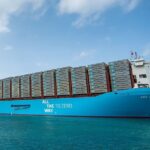Energy News Beat
Matt Kenney, the head of Laureate Communications, warns readers on how Trump’s economic policies could sideswipe the most ambitious maritime transformation in a generation.
Let’s begin with a truth so plain it should not require reiteration: President Trump’s tariff agenda is not a tantrum, nor a theatrical act of economic populism.
This cycle of underestimation has repeated often enough to become a caricature. But caricatures, like clichés, conceal as much as they reveal. Beneath the chaos lies a long game, one that is vital to US interests.
Trump has pulled the trigger on a plan to restructure the global trading order. (1) To reverse US de-industrialisation. (2) To defend the dollar’s supremacy, and (3) redraw the postwar map of economic and security dependencies around a renewed American centre of gravity.
First, unleash tariff disruption on a scale sufficient to unnerve the whole world. Second, establish a permanent framework of reciprocal tariffs to pressure key industries and sort countries in to buckets – green, yellow, and red. Third, and most ambitious, use this leverage to broker a new Bretton Woods-style agreement. A “Mar-a-Lago Accord” in which countries in the green bucket agree to align their currencies with the dollar, pay for American security guarantees, and re-enter a formalised hierarchy of global economic access.
If this sounds implausible, consider that the architects of this vision are not amateurs. US Treasury Secretary Scott Bessent, a hedge fund veteran who once helped “break the Bank of England”, and senior advisor Stephen Miran, a Harvard economist and author of A User’s Guide to Restructuring the Global Trading System, have spent years preparing the intellectual scaffolding for precisely this kind of realignment. They do not see the current tariff chaos as policy failure, but as step one. Trump is just the kind of trash-can banger needed to hammer it home decisively.
What the administration is attempting is nothing less than a replacement of the neoliberal order that took shape in the 1980s (one that prioritised capital flows, cheap imports, and strong-dollar finance) with a new order built around controlled access, managed exchange rates, and an industrial base sturdy enough to withstand a war.
The geopolitical implications are enormous. But so too are the consequences for sectors caught between the tectonic plates. Global shipping, in particular, faces the risk of being crushed not through negligence, but through omission. The maritime sector is not the object of the trade war, but it may well be its first major casualty.
The hidden cost of strategic disruption
In recent years, the shipping industry has made a credible attempt to invest in decarbonisation. New orders for dual-fuel vessels capable of running on LNG, methanol, and ammonia are at record highs. European regulators have introduced carbon pricing, lifecycle emissions accounting, and mandatory port infrastructure requirements. Large carriers have begun investing in zero-emission corridors, fuel certification schemes, and alternative bunker networks. For the first time in its history, shipping has the contours of a climate strategy.
But it is also a strategy on a knife’s edge. The costs are high. The incentives are fragile. The investment horizon is long and uncertain. Green fuels are vastly more expensive than conventional ones. Port infrastructure is patchy and unevenly distributed. Regulatory convergence is partial at best. The entire project depends on policy stability and economic coherence.
This is what tariffs now threaten to unravel.
When the United States raises import duties on low-cost machinery from Asia, the price of retrofitting green vessels increases. When reciprocal tariffs lead to reduced trade flows, the container volumes that fund operational upgrades decline. When a Chinese-built ship is penalised at an American port, regardless of its flag, registry, or operator, the global shipbuilding market is turned into a proxy battlefield.
The separation scheme
For China, the signal is unmistakable. Tariffs are not a disciplinary tool, they are an exclusion mechanism. China dominates global shipbuilding, exporting vessels at a scale unmatched by any other nation. If its shipyards are now treated as liabilities, it will not wait for inclusion. It will build a parallel system.
Already, Beijing is expanding its capacity for alternative fuels, investing in methanol supply, and hardwiring its Belt and Road network with maritime bunkering infrastructure. But could we be about to witness the splintering of maritime trade into two hemispheres? One system aligned with European and American regulatory frameworks. Another with Chinese capital, standards, and political guarantees? Is that still so crazy to consider?
If this bifurcation occurs, decarbonisation will become a collateral narrative. Each bloc could pursue its own methods, standards, and reporting protocols. Mutual recognition could wither, certification regimes could fracture, and the already fragile consensus on global climate action could dissolve altogether.
Between currency and carbon
The irony is rich. A strategy designed to protect American industry may end up undercutting the very industries poised to deliver the next wave of industrial reinvention. Clean fuels, advanced engines, port electrification, carbon sequestration, digital transformation — these are not niche interests. They are growth sectors, bursting with jobs, capital, and competitiveness. The fact that Homo Sapiens might also be able to cleave to our spinning rock a while longer comes some way down the list of benefits. In disrupting this, Washington is not asserting control. It is bleeding leverage.
The Mar-a-Lago Accord, if it ever materialises, will need more than nationalist posturing. It will require trust, consistency, and a willingness to listen to sectors that operate in the real economy, not just the imaginary scorecards of think tank white papers.
Global shipping does not need political sympathy. It needs a coherent policy. And if Washington now wishes to rebuild its industrial base while preserving dollar dominance, it must first acknowledge that global economic leadership cannot be willed into being by fiat. It must be earned through reliability.
In the end, the tariff war may not bring the collapse of the global trading system. But it may unravel the most ambitious maritime transformation in a generation — not by opposition, but by indifference.
That, history should not forgive.
The post How Trump’s new economic order risks sinking green shipping appeared first on Energy News Beat.









